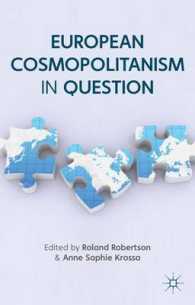- ホーム
- > 洋書
- > ドイツ書
- > Mathematics, Sciences & Technology
- > Earth Science
Full Description
This book explores the key principles and challenges of implementing the socio-ecological transition, with a particular focus on Quebec, Canada. It addresses these issues from both research and educational perspectives, offering actionable strategies to accelerate this transition across the province's various economic sectors. The book's structure aligns with the CIRODD (Interdisciplinary Research Center for Operationalization of Sustainable Development) scientific program, organized into two major sections and 11 thematic areas. The objective is to showcase the latest advancements in socio-ecological transition, drawing on a decade of research contributions from CIRODD. This book edition will highlight key innovations, emerging trends, and impactful solutions that have shaped the field, demonstrating CIRODD's pivotal role in driving sustainable transformation.
Section 1 delves into practical interventions and strategies for citizen engagement, exploring transition initiatives, urban planning, and collaborative knowledge-building models. It brings together theoretical, practical, and experiential insights, emphasizing the vital role of research and the arts in facilitating the socio-ecological transition.
Section 2 equips readers with the necessary tools to support this transition, offering models and methods for analyzing complex systems. It highlights innovative digital approaches for developing circular and sustainable business models.
This is an open access book.
Contents
Chapter 1: Introduction.- Chapter 2: Operationalizing urban ecology and circular economy in Montreal's South-West neighbourhoods using an interdisciplinary approach.- Chapter 3: Co-construction as implementation: The circular economy experience in Quebec. Consolidation stage (2021-2024).- Chapter 4: Intervention-Research as a Social-Ecological Transition Belt, Steering Wheel and Engine.- Chapter 5: Chemins de transition: an innovative method of knowledge mobilization to accelerate the socio-ecological transition in Quebec.- Chapter 6: Methodological proposal for graphic design education aimed at fostering social and environmental responsibility.- Chapter 7: Exploring Emerging NLP and Machine Learning Methods in Climate Change Discourse Analysis on social media: A Systematic Literature Review.- Chapter 8: Performance Indicators for Sustainable Remanufacturing Closed-Loop Supply Chains.- Chapter 9: Advancing Sustainability Through Digital Maturity: An Open Approach for Evaluating Quebec Organizations' Environmental Responsibility.- Chapter 10: Navigating the Shift: Strategies Beyond « Build it and they will come » for Sustainable Mobility in Quebec.- Chapter 11: Fostering Sustainability through Digital Evolution: Evaluating Industry 5.0 Preparedness in Quebec's Regional SMEs.







